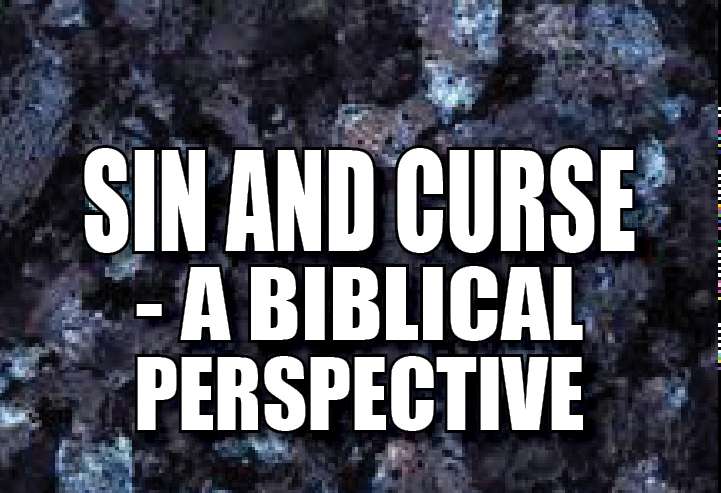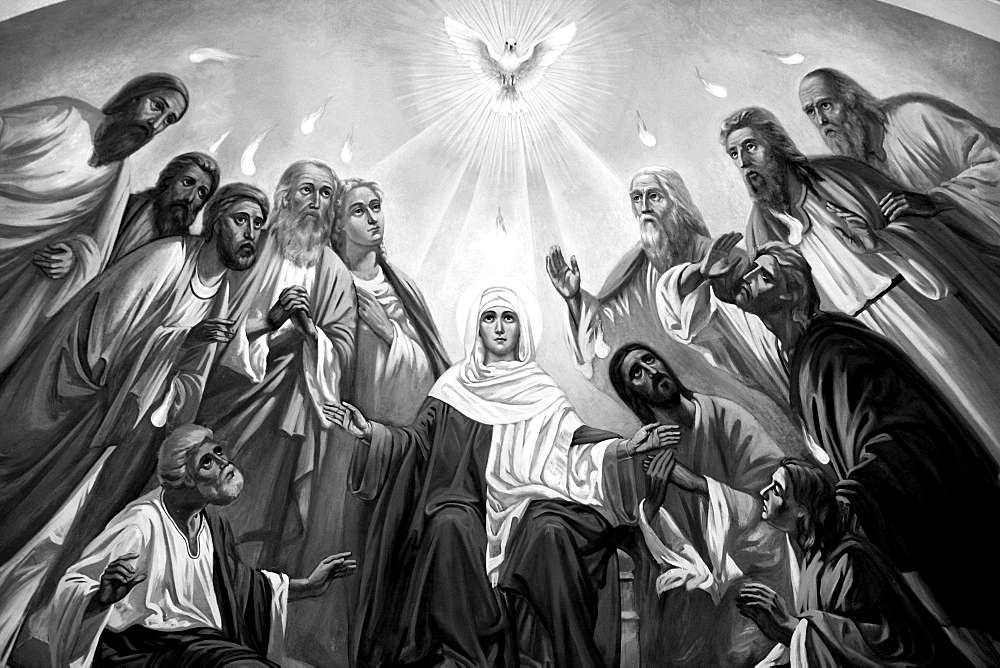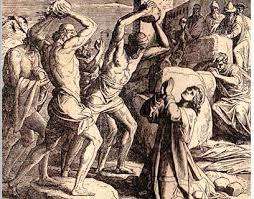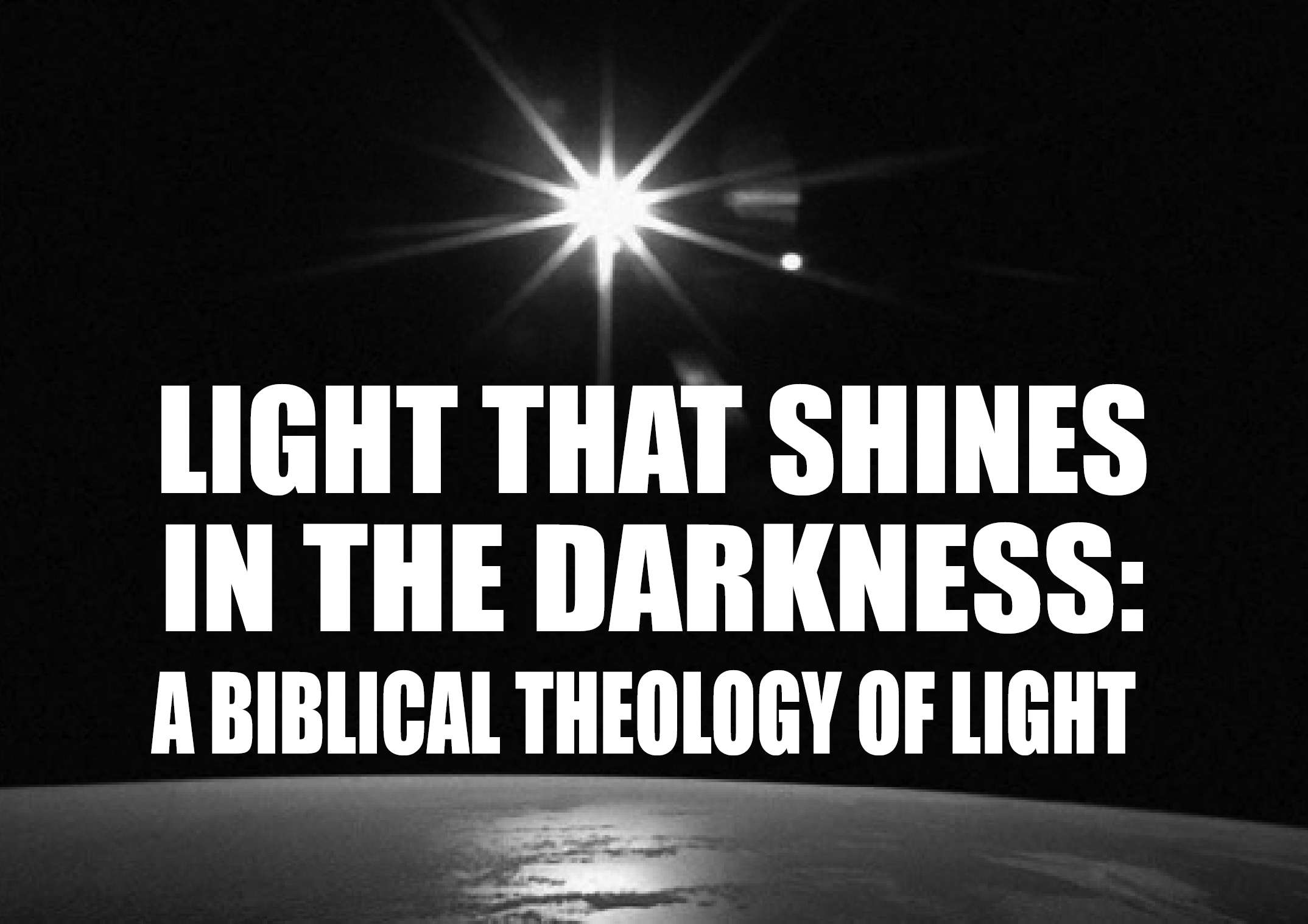

Sin and Curse - A Biblical Perspective
Dr. Shaibu Abraham
The history of the human race as presented in Scripture is primarily a history of humanity in a state of sin and rebellion against God and of God’s plan of redemption to bring man back to himself. World religions, philosophies and ideologies have endeavoured to explain human predicament in terms of various categories. However, Christian faith provides a more adequate perspective of the human plight and, most importantly, shows the root cause to be the fact of human sinfulness. In the following pages we shall explore the biblical perspective of sin and curse and their effects upon human beings (Here we are not discussing "curse" inflicted by the influence of evil spiritual forces or human actions).
Sin: Transgression of God's Will
Sin may be defined as the personal act of turning away from God and His will. It is the transgression of God's law, yet the act is ultimately against His person. David, after his violation of God's law, cried out, "Against you, you only, have I sinned and done what is evil in your sight" (Ps. 51:4). Sin is against God - against His holiness, love, and truth; it is deeply and profoundly personal. The Lord Himself, in the words of Isaiah, lamented concerning Israel: "Sons have I reared and brought up, but they have rebelled against me" (lsa. I :2). Thus, sin is a personal rejection of the Lord of love. Simultaneously, sin is the violation of God's command. It is the turning away from God's expressed will and a matter of wilful transgression. Paul says of mankind in general that "though they know God's decree ... yet they will not only do them but approve those who practice them" (Rom. 1 :32). Sin, thus is to act contrary to God's will either by action or by consent. In the idea of sin, there are the aspects of both deviation and rebellion. On the one hand, there is the failure to measure up to God's intention - a missing of the mark, there is a deviation, a going astray, a turning aside from God and His will. On the other hand, there is the direct rebellion against God's purpose or command. Hence, sin is an act of defiance for the purpose of pursuing one's own will and way. Therefore, whether sin is deviation or rebellion, it is a personal act against Almighty God.
Sin: Contrary to God's Holiness
Sin is directly opposite to all that is good in the character of God, It is, in essence, the contradiction of the excellence of his moral character. It contradicts his holiness. There are two basic aspects to God’s holiness. The first is his uniqueness. He is totally separate from all of creation. This is what we call the “majesty-holiness” of God. The uniqueness of God is affirmed in Exodus 15:11; “Who is like you, O Lord, among the gods? Who is like you, majestic in holiness, terrible in glorious deeds, doing wonders?” Similar expressions of the loftiness, the exaltedness, the splendour of God, are found in 1 Samuel 2:2 and Isaiah 57:15. The Hebrew word for “holy” means “marked off” or “withdrawn from common, ordinary use.” The verb from which it is derived suggests “to cut off” or “to separate.” For example, in the incident of the burning bush, Moses was told to take off his shoes since the ground on which he stood was holy (Exod. 3). In like manner, when God came down upon Mount Sinai, it was separated from the Israelite encampment. No one was to go up into the mountain or even touch the border of it, except Moses (Exod. 19). Similar restrictions applied to the tabernacle and later in the temple (Exod. 26:33; 1 Kings 6:16). Thus, God is totally separated from all that is this world and of evil.
The other aspect of God’s holiness flows out of the above mentioned quality of God, his separation from all that is ordinary and evil. That is his absolute purity or goodness. This means that he is untouched and unstained by the evil in the world. Habakkuk 1:13 addresses God: “Your eyes are too pure to behold evil, and you cannot look on wrongdoing”. Job 34:12 says, “Of a truth, God will not do wickedly, and the Almighty will not pervert justice.” Therefore, the people of Israel were expected to be “a holy nation”. They should reflect God's holiness through their moral qualities of righteousness, justice and love in which true holiness consists. Therefore, we should see the biblical understanding of sin from the notion of holiness of God.
Sin: Reason for Curse on Human Beings
The Bible teaches that sin began with the transgression of Adam, and therefore a voluntary act on the part of human. The tempter came with the suggestion that human, by placing himself in opposition to God, might become like God. Adam and Eve yielded to the temptation and committed the first sin by eating of the forbidden fruit, thus disobeying God. As a result, human beings were estranged from the fellowship of God they had cherished (Gen. 3:8) and they themselves became odd at each other (Gen. 3:12-13). Moreover, curse has befallen upon human beings. Even though the Genesis narrative does not mention God directly "cursed" human beings as a consequence of God's anger and punishment (Gen. 3:16-19), the idea is very obvious in the passage. The woman will have "greatly increased pangs" in childbearing and "domination of man over her" (v.16), the earth will be "cursed", unfruitful and "produce thorns and thistles" (v.17); therefore, the man has to earn and eat his bread with hard labour, with "sweat" and he will "return to dust" in death (v.19).It is obvious here that as a result of their disobedience and sin, the surrounding of human beings turned from the original blessed state into a cursed state. Besides, God had driven human beings out of the garden of Eden, from their original place where they had been created. This state of alienation from God, removal from their original place and position, and surroundings being cursed, can be surely considered as the curse upon human beings. The same state of curse had come upon Cain, after the killing of his brother, Abel (Gen. 4:10-12). But the matter did not stop there, for by that first sin, Adam became the bond-servant of sin. That sin carried permanent pollution with it, and would affect not only Adam but all his descendants as well.
Original Sin: The Sin that Inherited
Now the question is, how does the sin of Adam affect us? Adam sinned not only as the father of the human race, but also as the representative head of all his descendants; so that they are all liable to the punishment of death. Sometimes the doctrine of inherited sin from Adam is termed the doctrine of “original sin”. Scripture teaches that we inherit sin from Adam in two ways; inherited guilt and inherited corruption.
Inherited Guilt
We are counted guilty because of Adam’s sin. Paul explains the effects of Adam’s sin in the following way: “Therefore ... sin came into the world through one man and death through sin, and so death spread to all men because all men sinned” (Rom. 5:12). The context shows that Paul is not talking about actual sins that people commit every day of their lives (Rom. 5:12–21). Through Adam’s sin “death spread to all men because all men sinned” he is saying that through the sin of Adam all men sinned. This idea, that “all men sinned” means that God thought of us all as having sinned when Adam disobeyed. Here Paul also points out that from the time of Adam to the time of Moses, people did not have God’s written laws. Though their sins were “not counted” as violations of the law, they still died. The fact that they died is proof that God counted people guilty on the basis of Adam’s sin.
This fact is further affirmed in Romans 5:18-19: "[One] man’s trespass led to condemnation for all men and as by one man’s disobedience many were made sinners". When Adam sinned, God thought of all who would descend from Adam as sinners. Though we did not yet exist, God, looking into the future and knowing that we would exist, began thinking of us as those who were guilty like Adam. This is also consistent with Paul’s statement that “while we were yet sinners Christ died for us” (Rom. 5:8). Of course, some of us did not even exist when Christ died. But God nevertheless regarded us as sinners in need of salvation.
Inherited Corruption
In addition to the legal guilt, we also inherit a sinful nature because of Adam’s sin. David says, “Behold, I was brought forth in iniquity, and in sin did my mother conceive me” (Ps. 51:5). Some have mistakenly thought that the sin of David’s mother is in view here, but this is incorrect, for the entire context has nothing to do with David’s mother. David is confessing his own personal sin throughout this section (Ps. 51:1–4). David is so overwhelmed with the consciousness of his own sin that as he looks back on his life and realizes that he was sinful from the beginning.
In our natures we totally lack spiritual good before God. Every part of our being is affected by sin-our intellects, our emotions and desires, our hearts (the center of our desires and decision-making processes), our goals and motives, and even our physical bodies. Paul says, “I know that nothing good dwells within me, that is, in my flesh” (Rom. 7:18). Moreover, Jeremiah tells us that “the heart is deceitful above all things, and desperately corrupt; who can understand it?” (Jer. 17:9). Moreover, we also lack the ability to do anything that will in itself please God. Paul says that “those who are in the flesh cannot please God” (Rom. 8:8). Jesus also said, “Apart from me you can do nothing” (John 15:5). Unbelievers are in a state of bondage to sin, because “everyone who commits sin is a slave to sin” (John 8:34). Though people might be able to do much good, however, Isaiah affirms that “all our righteous deeds are like a polluted garment” (Isa. 64:6; cf. Rom. 3:9–20).
Actual Sin
Scripture in many places testifies to the universal sinfulness of mankind through their actions. “They have all gone astray, they are all alike corrupt; there is none that does good, no, not one” (Ps. 14:3). David says, “No man living is righteous before you” (Ps. 143:2). And Solomon says, “There is no man who does not sin” (1 Kings 8:46; cf. Prov. 20:9). Paul has an extensive argument in Romans 1:18–3:20 showing that all people, both Jews and Greeks, stand guilty before God. He says, “None is righteous, no, not one” (Rom. 3:9–10). He is certain that “all have sinned and fall short of the glory of God” (Rom. 3:23).
Curse of the Law
When the written law of God is introduced through Moses, unwittingly a further dimension of God's curse and punishment came upon human beings (Num. 27:11-26; 28:15-68). Since God's law is perfect and holy, the violation of it invites anger and punishment of God, thus resulting in the infliction of "curse" as in the case of Adam. Paul very clearly points out this fact: "For all who rely on the works of the law are under a curse, as it is written: 'Cursed is everyone who does not continue to do everything written in the Book of the Law'" (Gal. 3:10). The fact is that, God's law is binding on all, however, because of sinful nature of humanity (the inherited sinful nature and our own sinful deeds), human beings are unable to fully obey the law, thus brings down curse upon them. Therefore, Paul says that "no one is justified before God by the law" (Gal. 3:11).
Source of Sin
Human beings have a number of natural desires which, while good in and of themselves, are potential areas for temptation and sin.
1. The desire to enjoy things: God has implanted certain needs in each of us. Not only is the satisfaction of those needs essential, but it can also bring enjoyment. For example, the need for food and drink is for sustenance of life and also is a source of enjoyment. However, when they are pursued merely for the pleasure of consumption, the sin of gluttony is being committed. Similarly, the sex drive is essential for continuing the human race and also brings pleasure. When, however, the drive is gratified outside of marriage, it becomes the basis of sin and becomes “the lust of the flesh” (1 John 2: 16).
2. The desire to obtain things: There is a role in God’s economy for the obtainment of possessions(Gen.1:28; Matt.25:14-30). Further, material possessions are regarded as legitimate incentives to encourage industriousness. When, however, the desire to acquire worldly goods becomes so compelling that even by exploiting or stealing from others, then it has degenerated into “the lust of the eyes” (1 John 2: 16).
3. The desire to do things: The desire to achieve good things is natural and appropriate. It is part of what God expects of man. When, however, this urge transgresses proper limitations and is pursued at the expense of other humans, it has degenerated into “the pride of life” (1 John 2: 16).
The Result of Sin
Sin produced an immediate negative effect in the relationship which Adam and Eve had with God. They had evidently been in an intimate relationship with God. However, as they had violated the trust and the command of God, the relationship became quite different. This brought as we have seen, divine disfavour (Hos. 9:15; Jer. 12:8; Ps. 5: 5) and guilt upon human beings (Rom. 1:21). As a result, punishment and death have been inflicted on humanity (Gen. 6; Isa.1:24; Jer. 46:10; Ezek. 25:14; Ps. 94:l; Gen. 2:17; Rom 6:23). It is not only physical death (Rom. 5:12), but spiritual death and eternal death (second death) befell humanity (Rev. 20:14; Mt. 25: 34-40).
Concluding our discussion, the self dependence and disobedience of first human beings resulted in the fall of humanity and effecting guilt and curse upon them. As a consequence, punishment and death ensued, both physical and spiritual. It also brought eternal death. However, through one man Christ, humanity achieves abundance of grace of God, free gift of righteousness and eternal life (Rom. 5:15,17). Even though one man's trespass (Adam's) led to condemnation for all, so one man's (Jesus') act of righteousness leads to justification and life for all (Rom. 5:18). Sin and curse are nullified in Christ Jesus and those who put their trust in him is justified by God himself (Rom. 3:24-26).


















